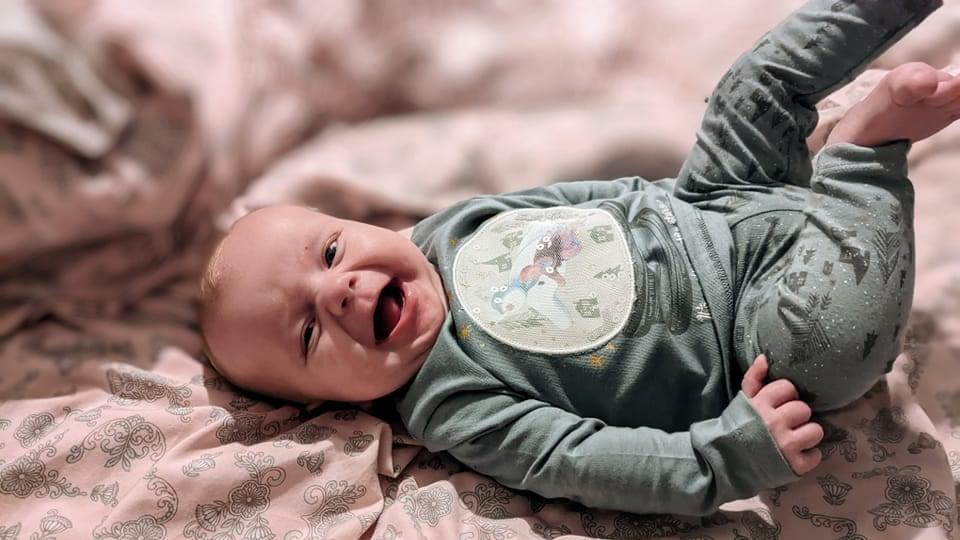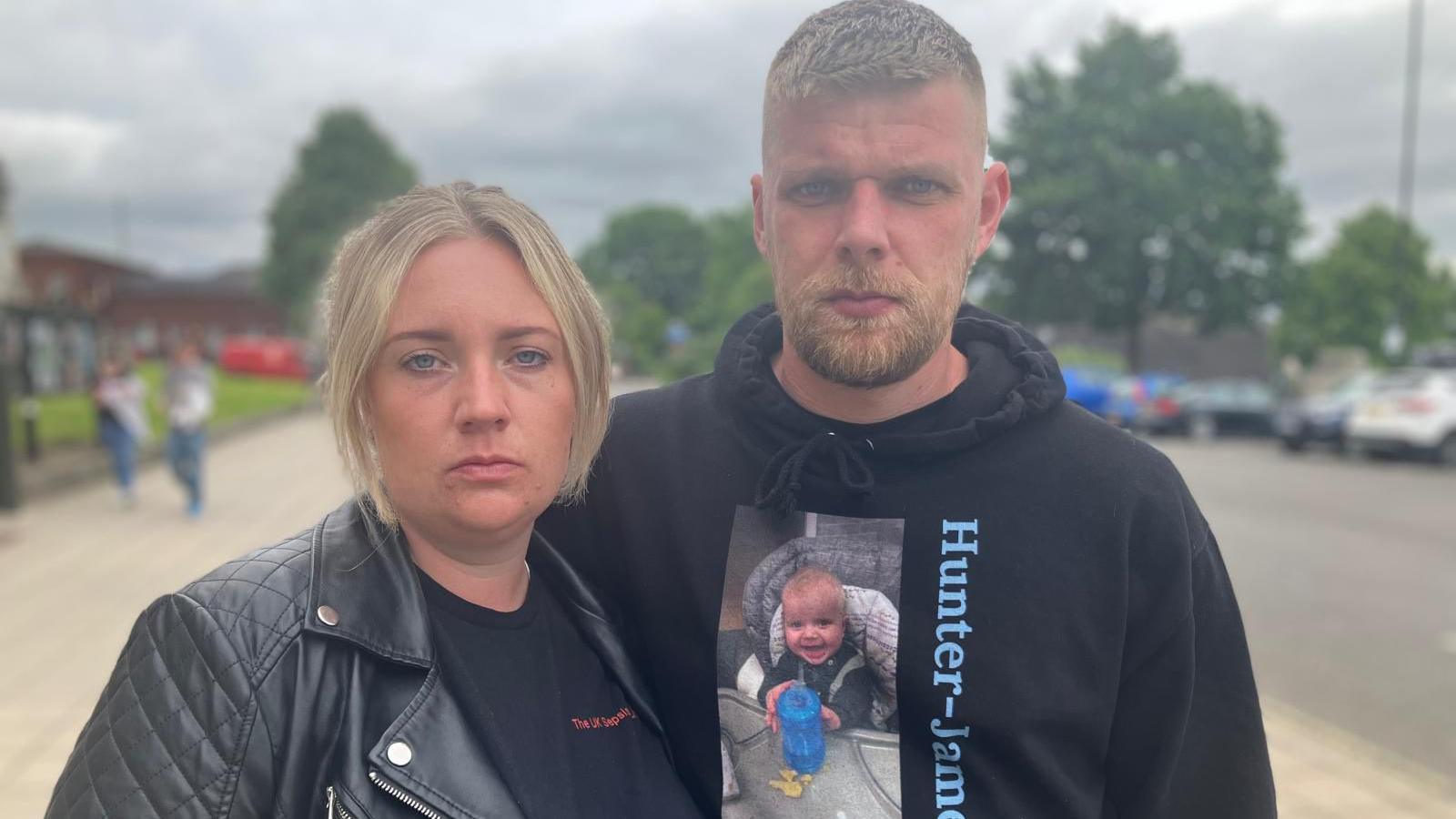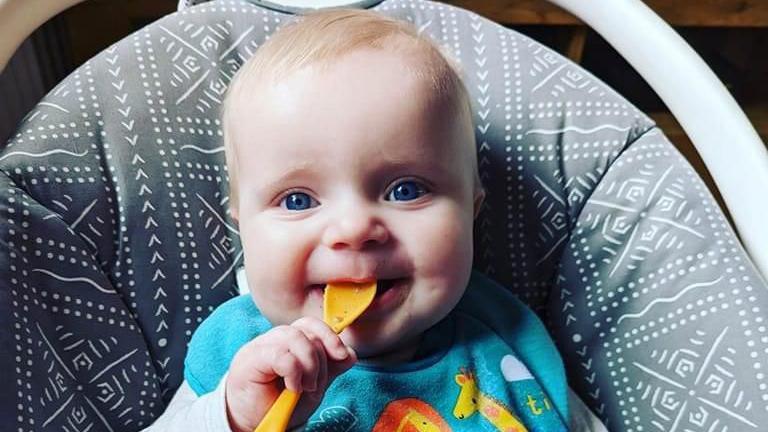Trust admits failing baby who died with chicken pox

Hunter Martin was described by his mum as a "blue-eyed angel".
- Published
An NHS trust has admitted failings over the care of a baby who died after contracting chicken pox.
Hunter Martin died aged six months on 6 March 2023 after an infection escalated, an inquest at Chesterfield Coroners Court heard on Monday.
His parents, Alex Martin and Jade Smith, from New Whittington, Derbyshire, say their concerns were not taken seriously and their lives "will never be the same".
The inquest heard that, after presenting with signs of infection, Hunter was wrongly given 10 times the recommended dosage of antibiotics.

Jade Smith and Alex Martin say they miss Hunter terribly
A pathologist and toxicologist both gave evidence at the inquest, which was held in front of a jury, but neither could give a firm view on the impact the over-administration of the Clyndamycin antibiotic had on Hunter prior to his death.
Coroner Peter Nieto gave an outline of the events, starting with Hunter's parents taking him to Chesterfield Royal Hospital in the early hours of 4 March after becoming concerned about symptoms that arose after Hunter contracted chicken pox.
Mr Nieto said Hunter presented with a temperature, which later dropped and it was suggested his parents could take him home.
However, Mr Martin and Ms Smith found he was unwell the next morning and were advised to take him back into hospital, the jury heard.
A statement written by Ms Smith was read at the hearing, saying Hunter's belly button was "protruding and purple in colour" on 4 March, which she raised with a doctor at Chesterfield hospital.
The jury heard Ms Smith describe Hunter on the morning of 5 March as "unresponsive" and "almost grey".
Her statement added: “When staff finally saw Hunter, you could see the instant panic on their faces. It was all hands on deck trying to get cannulas and stuff into him.”
Hunter had two cardiac arrests before being transferred to Sheffield Children's Hospital, where suffered a third and died on 6 March.

Hunter Martin was often found attached to his mother's right hip, she said
After Hunter's death, it became apparent that there had been a miscalculation on the dosage of his antibiotics on five occasions on 5 and 6 March.
The jury heard that instead of the recommended doses of 94mg, Hunter received 940mg.
Coroner Nieto said the "two broad issues" for the jury to consider were the "missed opportunities" to treat Hunter and avert his death, and the role of the over-administration of antibiotics in relation to his death.
Ms Smith's statement said: "As we move forward with our lives, there will always be an empty place. Always a 'what if'. Mistakes of this size should not be happening.
"We miss Hunter terribly, and our lives will never be the same. There's a deathly silence that lingers over our lives now, a position we never imagined being in.
"This will affect our lives forever."
'Would have survived'
In a statement read during the proceedings, Chesterfield Royal Hospital NHS Foundation Trust said ibuprofen had been given to Hunter, which went against its guidelines for treating chicken pox.
It admitted this "probably masked the early signs of his infection", adding that Hunter should have had a clinical review and remained under observation for longer.
The trust's statement added that this "false reassurance" led to a missed diagnosis of Group A Streptococcal infection on Hunter's first admission.
It added: "It is admitted that, on the balance of probabilities, had the bacterial infection been suspected and treated with IV antibiotics by 14:30 on 4 March, Hunter would have survived.
"However, it is accepted in hindsight that there were later missed opportunities to recognise worsening features of sepsis and escalate care to tertiary intensive care, this is due to the mixed picture of Hunter's observations and clinical status."
The trust offered a "profound" apology to Mr Martin and Ms Smith, adding it had "identified areas that required improvement" to prevent similar incidents in the future.
The inquest continues.
Follow BBC East Midlands on Facebook, external, on X, external, or on Instagram, external. Send your story ideas to eastmidsnews@bbc.co.uk, external.